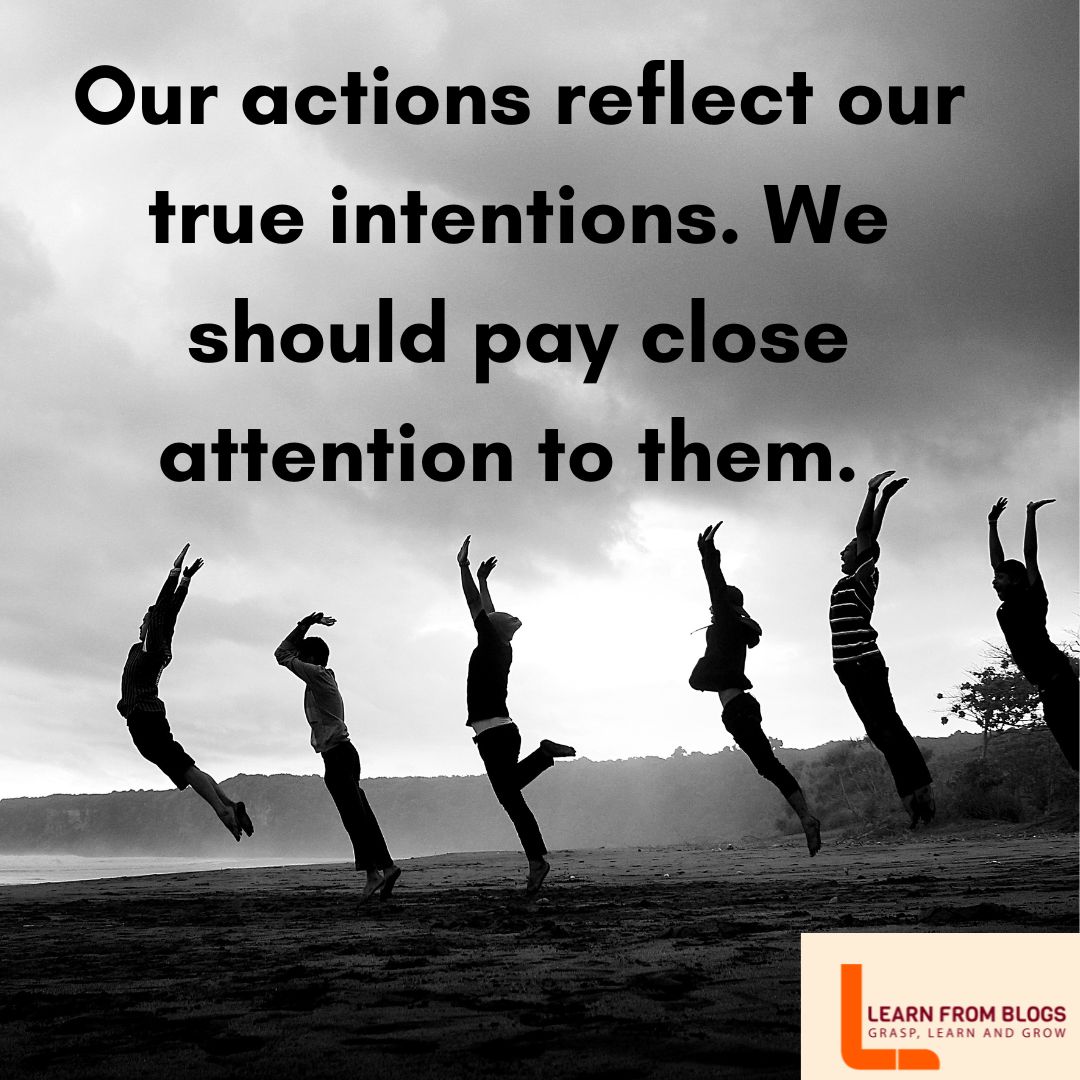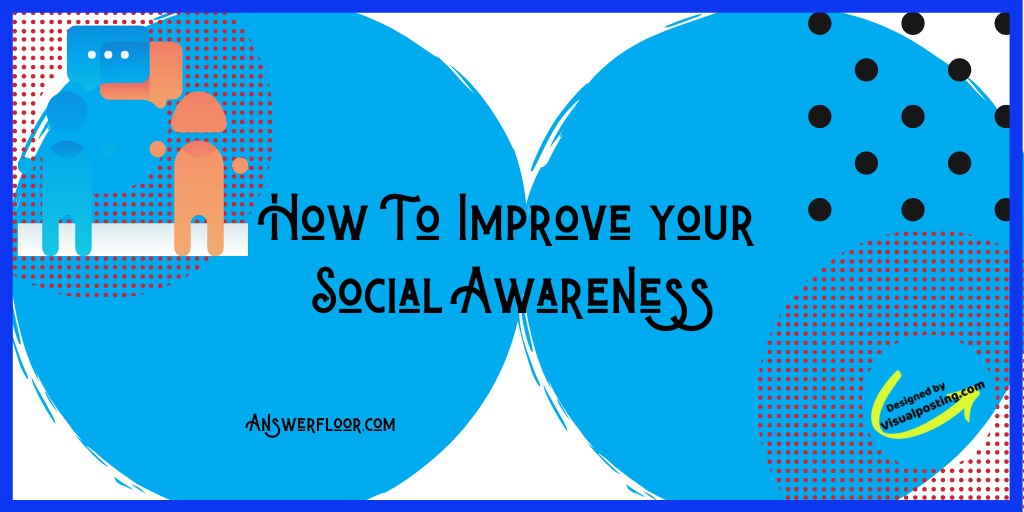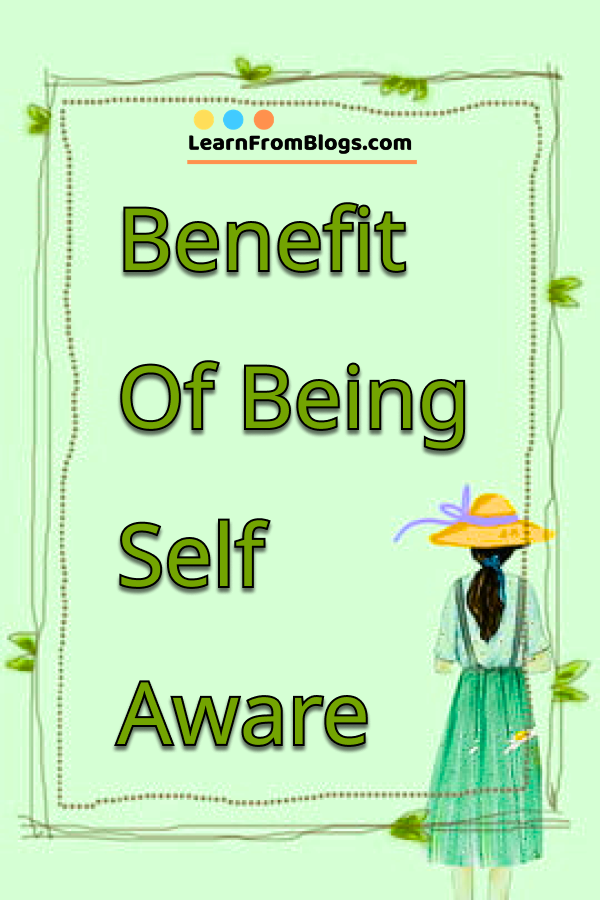7 ways to improve your social awareness
These social skills activities can help you improve your social awareness.
1. Give importance to listening
2. Make it a practice to repeat what is said
3. Pay attention to the tone
4. Keep an eye on the body language
5. Place yourself in other’s shoes
6. Identify your own emotions
7. Reflect back
If you are looking to develop great relationships and build genuine friendships, you need to work on these skills. Furthermore, it forms great interactions that help build social awareness. Similarly, take ownership of your behavior and ask for feedback. It is also important to notice the behaviors of others that may cause you to respond negatively.
Additionally, if you receive negative feedback, take it on a lighter note. Make sure you work on it. Work on building your positive traits. Besides, use them to your advantage when you communicate with others. Improving your social skills isn’t an overnight task. It takes consistency, patience, and determination to follow a path. With the right kind of aim and passion, no skill can’t be learned.
Better and healthy relationships
It can be quite tricky to decide on what we want and what we need in a relationship. Especially if we aren’t sure of what they are. However, the less self-aware we are, the higher are the chances of us being defensive in relationships.
In addition, this can be a disaster if we do not review or analyze ourselves. For instance, you can’t keep fighting for something if you aren’t sure if that’s what you really want. Hence, if you want to build healthy relationships, it is crucial to be self-aware. The better we know ourselves, the better the relationships we can build.
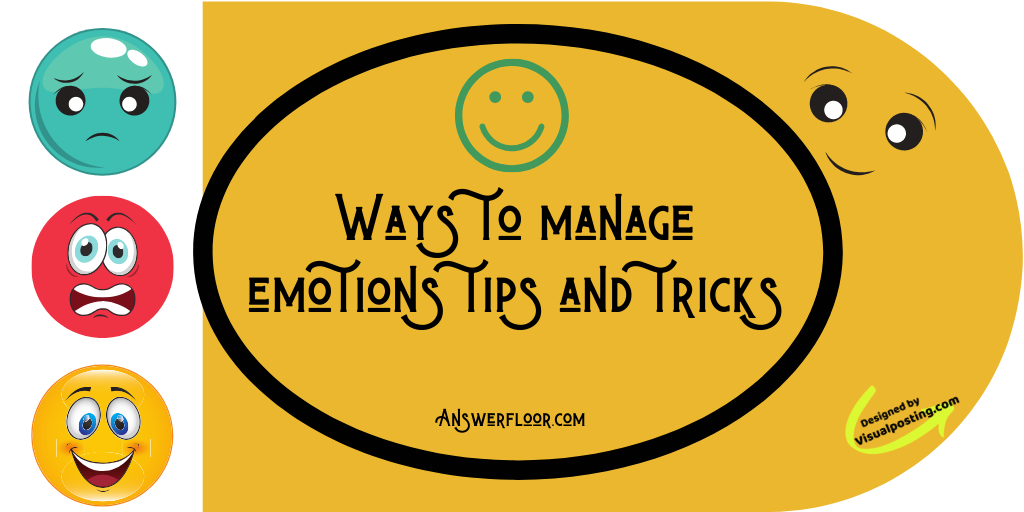
It is quite possible to take control of our actions and emotions. Emotions are a complex reaction that behaves the way we react to them. Similarly, it all depends on our perspective. If we wish to see things in a positive light, our mind believes the same. On the other hand, if negativity overpowers our minds, we tend to take things negatively. There are many ways we can manage our emotions.
8 ways to manage emotions
1. Learn why emotions are difficult to get over
2. Assign meanings to emotions
3. Don’t ignore your emotions
4. Identify the emotion
5. Ask yourself if the emotion will do you any good?
6. Remind yourself that this shall pass
7. Find the source of emotion
8. Accept the fact
There are multiple ways that you can control your emotions. Work in order to live a life of positivity and harmonies. If you feel you can’t get enough help, try talking out to people and discussing issues. Similarly, be open with your feelings. This will help you gain a new perspective. Additionally, it will help you come out of your bubble. Talk to your parents, friends, or counselor to seek advice.

Emotional intelligence (EI) is the ability to recognize, understand, and manage our own emotions, as well as the emotions of others.
It encompasses skills like empathy, self-awareness, self-regulation, and social skills. While traditional intelligence (IQ) focuses on cognitive abilities, EI plays a crucial role in personal and professional success.
One of the key benefits of emotional intelligence is enhanced interpersonal relationships. People with high EI can navigate social situations effectively, communicate clearly, and resolve conflicts peacefully.
They are empathetic listeners who understand the perspectives of others, fostering trust and cooperation.
Emotional intelligence also contributes to effective leadership. Leaders who possess EI inspire and motivate their teams, create a positive work environment, and adapt to change with resilience.
They excel in decision-making by considering both rational analysis and emotional implications.
Moreover, individuals with high EI tend to have better mental health outcomes. They can manage stress, cope with setbacks, and maintain a positive outlook on life. This resilience leads to greater overall well-being and satisfaction.

Do you ever meet a child who seems to have needy behavior? Or perhaps a child who fears authority? How about a little one who keeps shouting, crying and throwing tantrums anywhere? Then you might have encountered a child with developing toxic personality. A child with bad inner experiences.
As a parent or guardian, we should address these experiences of an inner child at an early stage of his/her development to prevent unwanted behavior to sprout while he/she is growing up. Many researchers have proven that children who experienced a lack of attention during their formative years created a psycho-behavioral effect later on.
It is timely that while we are gathered together at home due to week-long quarantine in light of COVID 19 attack, to start tuning-in these inner experiences within our child or even within ourselves who sometimes manifest the symptoms.
Here are some positive outlooks I provide to my children to support their inner experiences while we are in observance of home quarantine, which you could try.
** Now and then, I remind them how special they are from my eyes, as their mother. The sense of attention and assurance are very important for children, so I make them feel how I treasure each one of them.
**Behind this worldwide pandemic, I make them feel how safe they are in my hands and under my protection so it will imprint in their heart and mind that they can trust their life on me and later they will do the same to other authorities.
**Speak kind words every time I open my mouth because of a loving and soothing words last longer in their memory.
So, start spreading love and empathy within your house by tuning in everyone's inner child.
Do you have a kindergarten at home? Was there a time that it was difficult for your child to let go of you when you send him/her to school?
Our children, as I have told in my previous post, are incapable of expressing their emotions. In times like this, we should be more understanding of their behavior by securing their emotions and boosting them afterward.
Here are some tips to boost emotional security:.
* Teach our children to express themselves by showing them different faces of emotions through flashcards. Visualizing expressions like being happy, sad or mad makes it easier for the children to distinguish what he/she feels and gradually imitate the expressions for us to evaluate, approve or accept;
* Make them feel that they can trust you for keeping promises. Build trust on your child towards you so when you promise something, he/she can hold on to that and believe in you;
* Whispering kind words instead of scolding them in front of other people build their confidence. You may tell them how excited you are to see their achievement when you come back. Encouraging words are worth an assurance that you care.
*Most of the time, hugging fulfills the goal of securing his/her emotions.
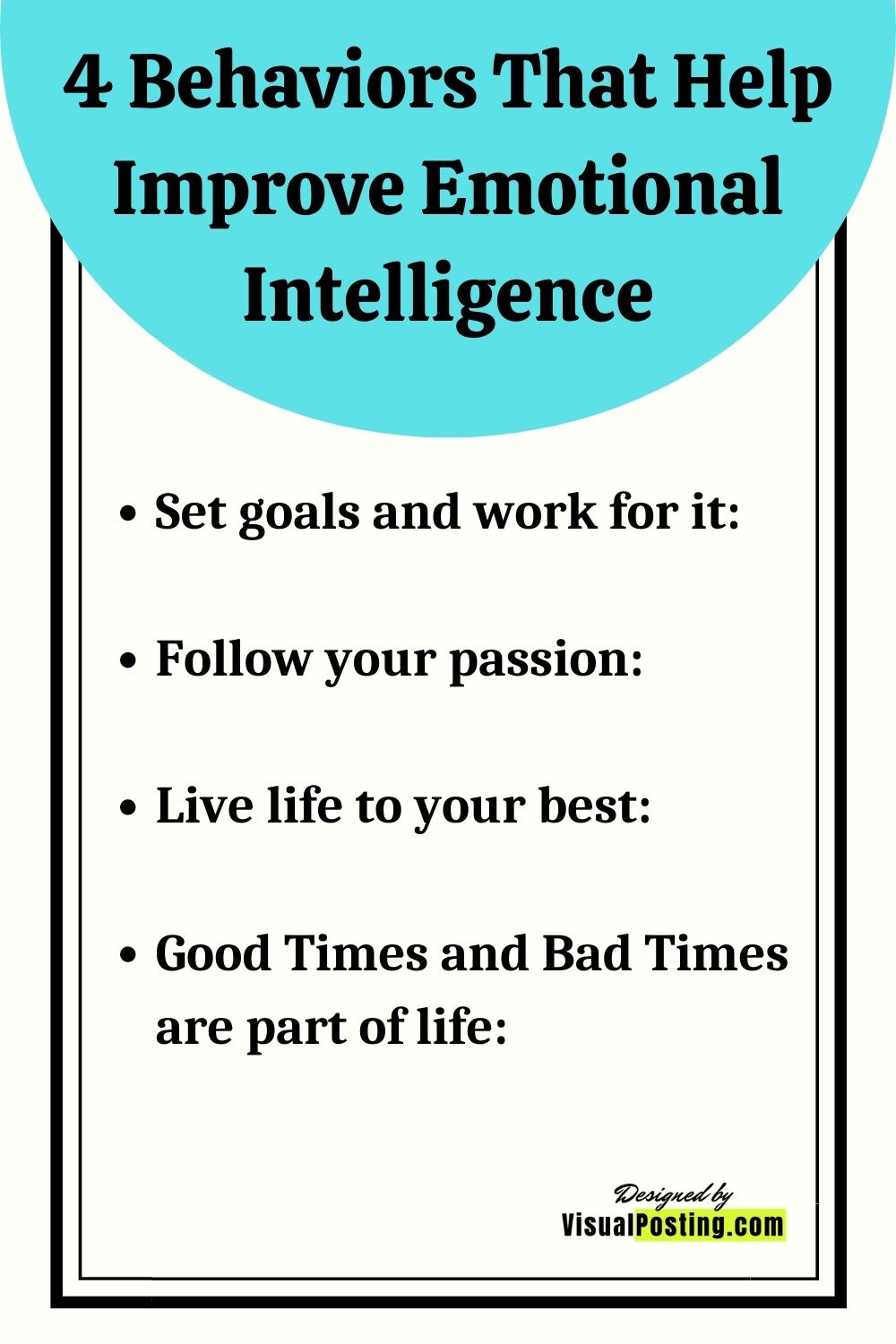
Developing Emotional intelligence helps you handle life situations in a better way. It applies to each walk of your life, including your education, work, personal, business, and socializing. Emotional intelligence is impactful. It makes you a better person every day. It helps you build good relations, emotional stability, and confidence that eventually solve almost all your problems. I have shed some light on emotional intelligence.
1. Set goals and work for them:
Write your goals. Even if it is a short term goal, write it down. Have a vision board and stick things that you like to achieve. It gives motivation to you. Setting goals and working for them is also a form of emotional intelligence.
2. Follow your passion:
Following your passion can bring positive outcomes to you emotionally and mentally. Your passion brings happiness and self-contentment.
3. Live life to your best:
Live life to your fullest with friends and loved ones. Life is a balance of positives and negatives. Do not worry when things are not going your way. Time heals everything. Time changes everything. Life is filled with blessings. Look around. Live it to the fullest.
4. Good Times and Bad Times are part of life:
This point is a key step towards improving your emotional intelligence. Good and bad are part of life. This stability and understanding are essential to take your life in a balanced way.
In practice, time and experience will shape your emotional intelligence. Over time you will learn life lessons, which in turn build a great level of emotional intelligence. Emotional intelligence takes time so give it. Meanwhile, start implementing little changes that can improve your emotional intelligence.
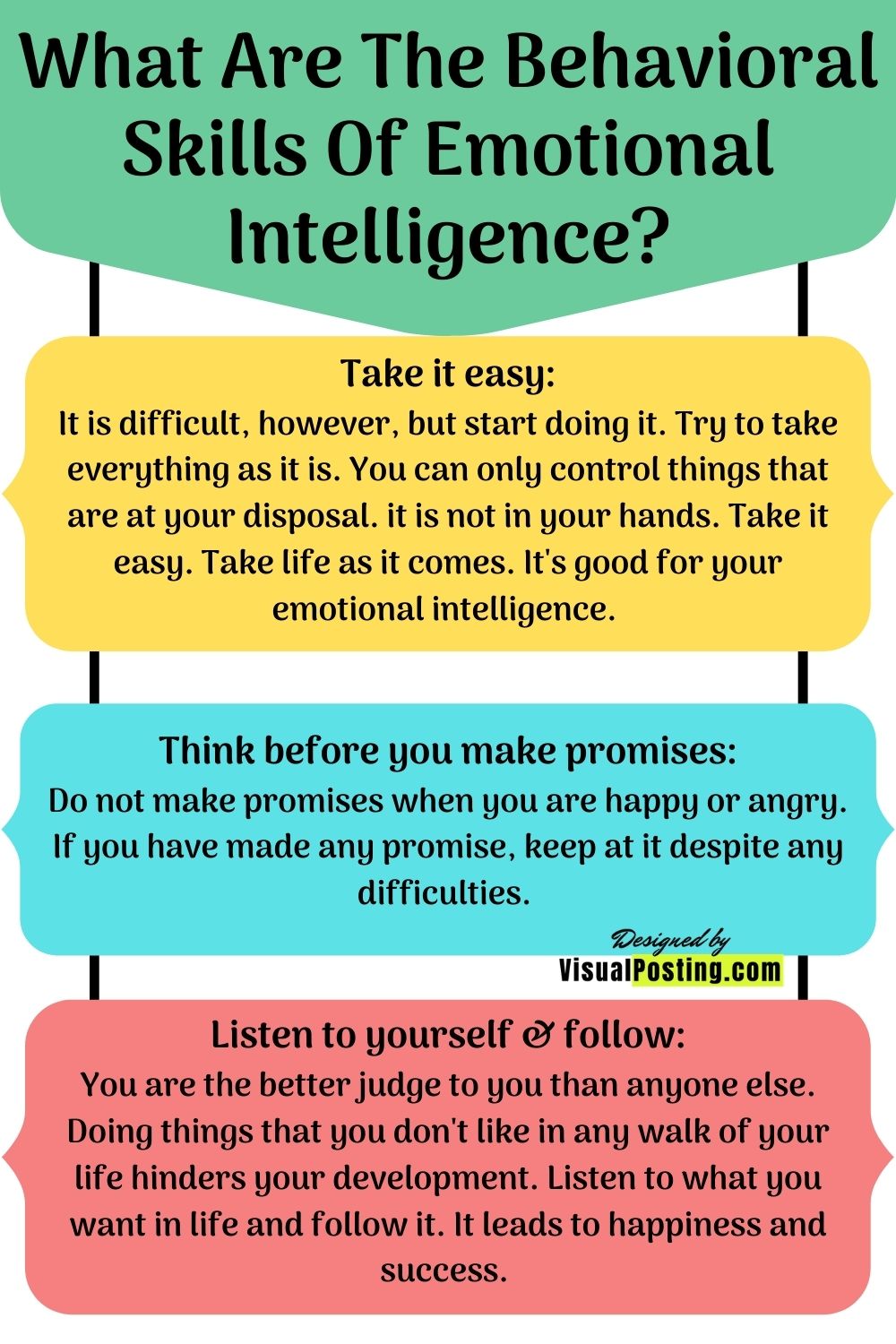
Take it easy:
It is difficult, however, but start doing it. Try to take everything as it is. You can only control things that are at your disposal. It is not in your hands. Take it easy. Take life as it comes. It's good for your emotional intelligence.
Think before you make promises:
Do not make promises when you are happy or angry. If you have made any promise, keep at it despite any difficulties.
Listen to yourself & follow:
You are the better judge to you than anyone else. Doing things that you don't like in any walk of your life hinders your development. Listen to what you want in life and follow it. It leads to happiness and success.
Handling emotions is a lifelong lesson:
Even the mature person can lose control and act out of emotions at some point. Emotional intelligence is more like a lifelong learning lesson that you perfect every day.
You are not above or below anyone:
The inferiority complex negatively brings emotional outcomes starting with anger. In the same way, superiority brings negative outcomes in the form of ego. Both are bad personality traits. Take care that you don't step into any of the above behaviors. It is important for your emotional intelligence.
Let go of the ego:
Let go of the ego. It is the key behavior that you need to improve your emotional intelligence. Ego brings no good. The ego will not bridge the gap between people. It has no positive outcomes when you show it, or someone shows it to you.
Don't hesitate to get down for a Sorry:
Be the first when it comes to saying sorry. Strong people are the ones who don't hesitate to ask sorry and give forgiveness. Bring in this good habit.
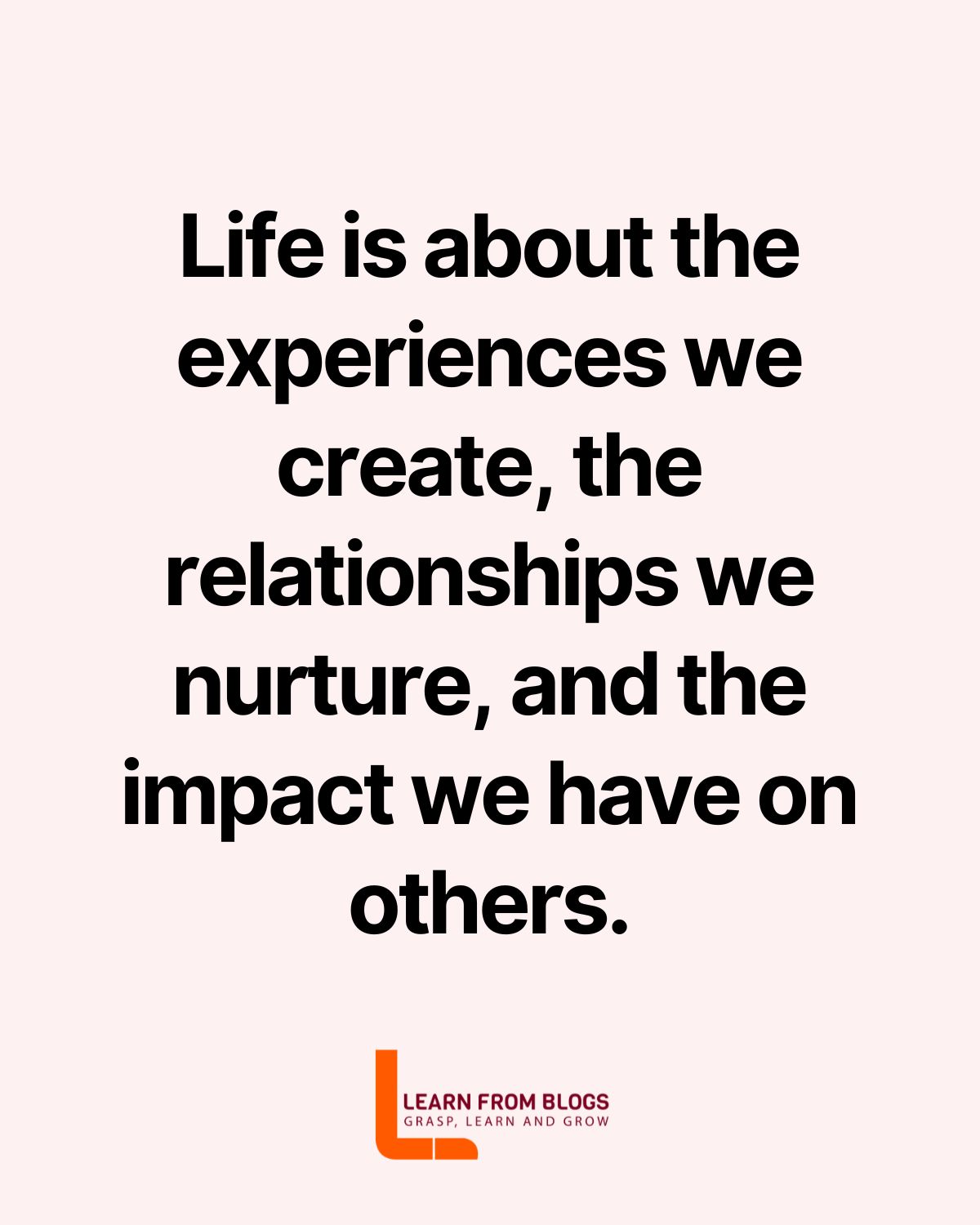
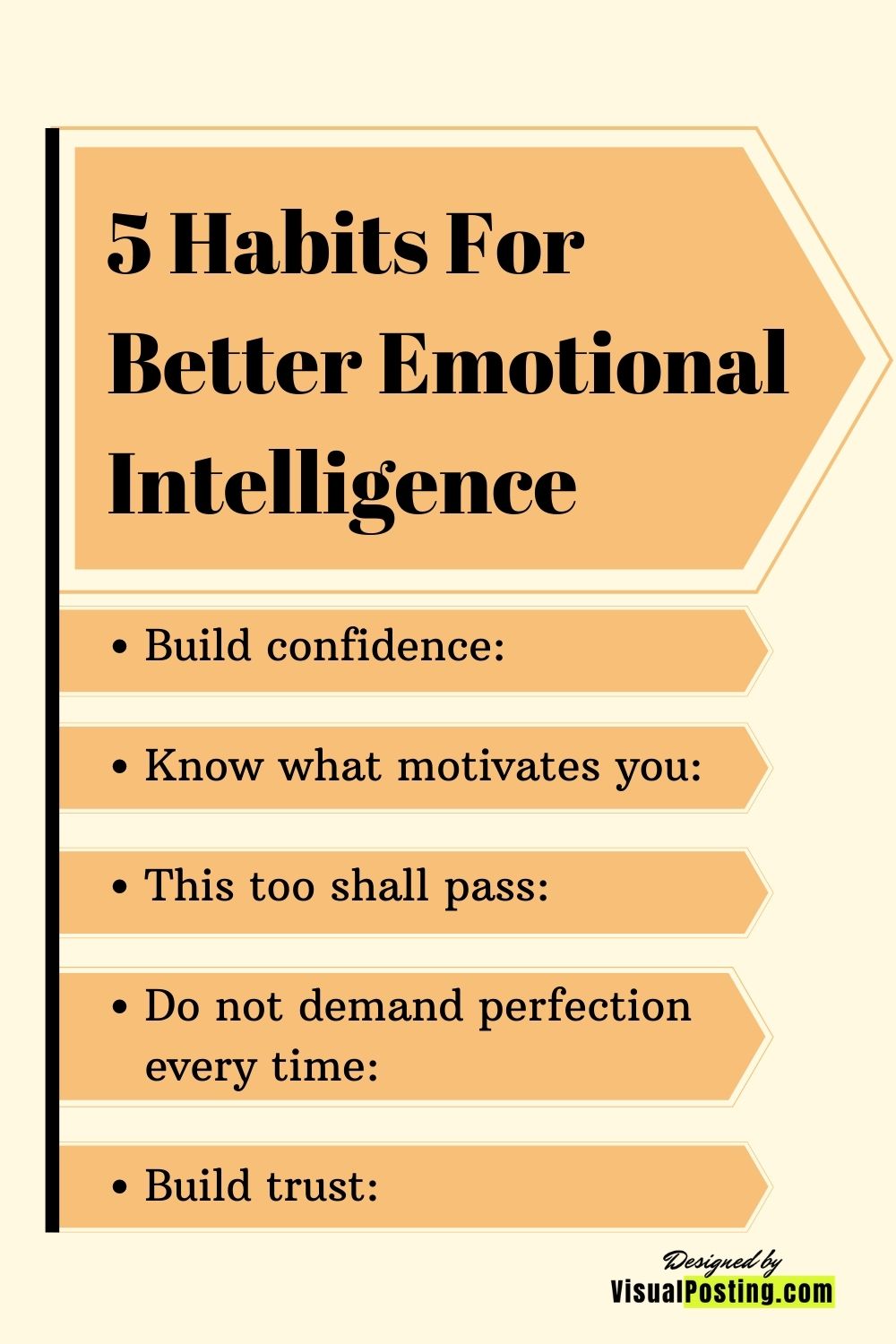
1. Build confidence:
A Confident person achieves more than those who feel insecure. Trust yourself that what you are doing is right and you can do it. Confidence comes automatically to you. Make sure to put a stop when the confidence you have becomes an over-confidence trait.
2. Know what motivates you:
Look into factors that motivate you. People often find things they do unrewarding or unproductive due to a lack of motivation and interest. Take care of it. Identify things that motivate you and keep at it.
3. This too, shall pass:
Nothing is permanent. People ad emotions change over time. Difficult times can nurture forgiveness and compassion. Remind yourself that 'this too shall pass.' This is a key behavior to improve your emotional intelligence during tough times in life.
4. Do not demand perfection every time:
Perfection has its beauty but not always. You cannot expect people to be perfect or reciprocate your level of perfection. Accept people, friends, and families around you for who they are. Perfection in work can sometimes make you stressed and lose focus. Give your best in the things you do. Don't make it a stressful process. Perfection is a balance. Keep it that way. Demanding perfection every time can break the balance.
5. Build trust:
Nothing works without trust. Build it with people around you professionally and personally. Trust can sometimes go wrong. By that time, it will be the hardest life lesson for you. It is also good. In the end, everything around us is built on trust, so work on it.
1. Celebrate your life:
It's one life. Celebrate success. Celebrate your failures too as you get to learn a life lesson that nobody could have taught you. Take time to enjoy your life's blessings.
2. Be grateful:
If you need to grow, think of people above you. If you need to be happy, look down to people who don't have what you have. Be grateful to things that life gave you. Work hard for your success. Being grateful is also a form of behavior that help improve your emotional wellbeing and intelligence.
3. Practice gratitude journaling:
Gratitude journaling is to put things in perspective for you. It is to make you see how blessed you are. To look at the good and not to worry about what you don't have is a good practice for self-growth. At the end of the day, fill your journals with things you are blessed and grateful for.
4. Spend time with people you love:
It can make you happy, elated and stress-free. Spending time with friends, family and loved one is always a wonderful investment that you can make with your life.
5. Travel:
Travel has changed many people's perspectives on life. Traveling is good and if you could then don't hesitate to take the trip. Even a short trip is a good mood booster.
6. It takes time:
Emotional intelligence does not come in a day. As we can see, people who have suffered in life seem to be more emotionally intelligent than those who have been happy until now. Emotional intelligence comes with experience. On the contrary, there are good behaviors that you can implement from the start to improve your emotional intelligence.
1. Mentally subtle & stable:
It can be difficult but in time you will understand the need for good mental stability and subtlety. Mental wellness is always in your hand in the end. A mentally subtle and stable person can handle any difficult situations with ease. It's a key behavior to improve your emotional intelligence.
2. Do not criticize:
Avoid criticizing or shaming fellow persons even in person or in public. It's bad behavior. On the other hand, constructive criticism is good. The irony here is some people can't handle even a constructive-criticism. It's a mixed bag. Tread carefully when it comes to criticisms.
3. Follow an easy time-management strategy in your daily life:
Time management is important. You know your life and routines better than anybody else. Follow a time-management strategy that suits your lifestyle. Managing the time that you have is beneficial in many ways.
4. Self-respect is important:
Self-respect is the best shield a person could have in the entirety. Respect to self is a key emotional intelligence that you need to succeed in your life.
5. Acceptance:
Good things, bad things, and unexpected things are all part of life. Things going off your plans are common. Acceptance is key. It is a form of emotional intelligence. Accepting can help you stable the emotional overwhelming. It shows the next step.
6. Nurture positivity:
Positivity should be a way of life. It is not a strategy that we should follow or try to implement. It is something that comes from within. Starting your day by folding your bed, grateful that you are well, cleaning the room is a simple form of positivity that you can follow as a way of life. Make positivity your way of life.
1. Do not succumb to peer pressure:
You are unique. Do not let others decide yourself. Do not let people and situations to alter your good self. Do not succumb to your Peer Pressure. Think about what is right and do it. do not allow other people to cloud your judgments. Always do what is right. Be yourself. It matters.
2. Enjoy what you do:
Enjoy what you do else every day and every minute will seem like an eternity to you. Understand that, doing things that you don't enjoy or like will not help you in the long run.
3. Have time to do things you like:
Take the time to do things you like. It can be your hobby, arts, music, books, taking short vacations, long car rides, hanging out with friends, etc. the list goes on. Doing things that you like boosts your emotional wellness higher.
4. Good food equals good life:
Good food takes care of your health. When it comes to unhealthy processed foods, it changes the entire way the body functions. Unhealthy fats, beverages, and sugars will block your body function to a great extent. Maintain a proper healthy meal plan. Eating as when needed should be avoided.
5. Physically active:
Being active physically has a direct connection with your mental wellness. An early morning walk, or breathing exercise or simple stretching are a few examples that we can consider taking. Spend at least 30 minutes each day to keep yourself physically active. It improves your healthy hormones which in turn leads to better health.
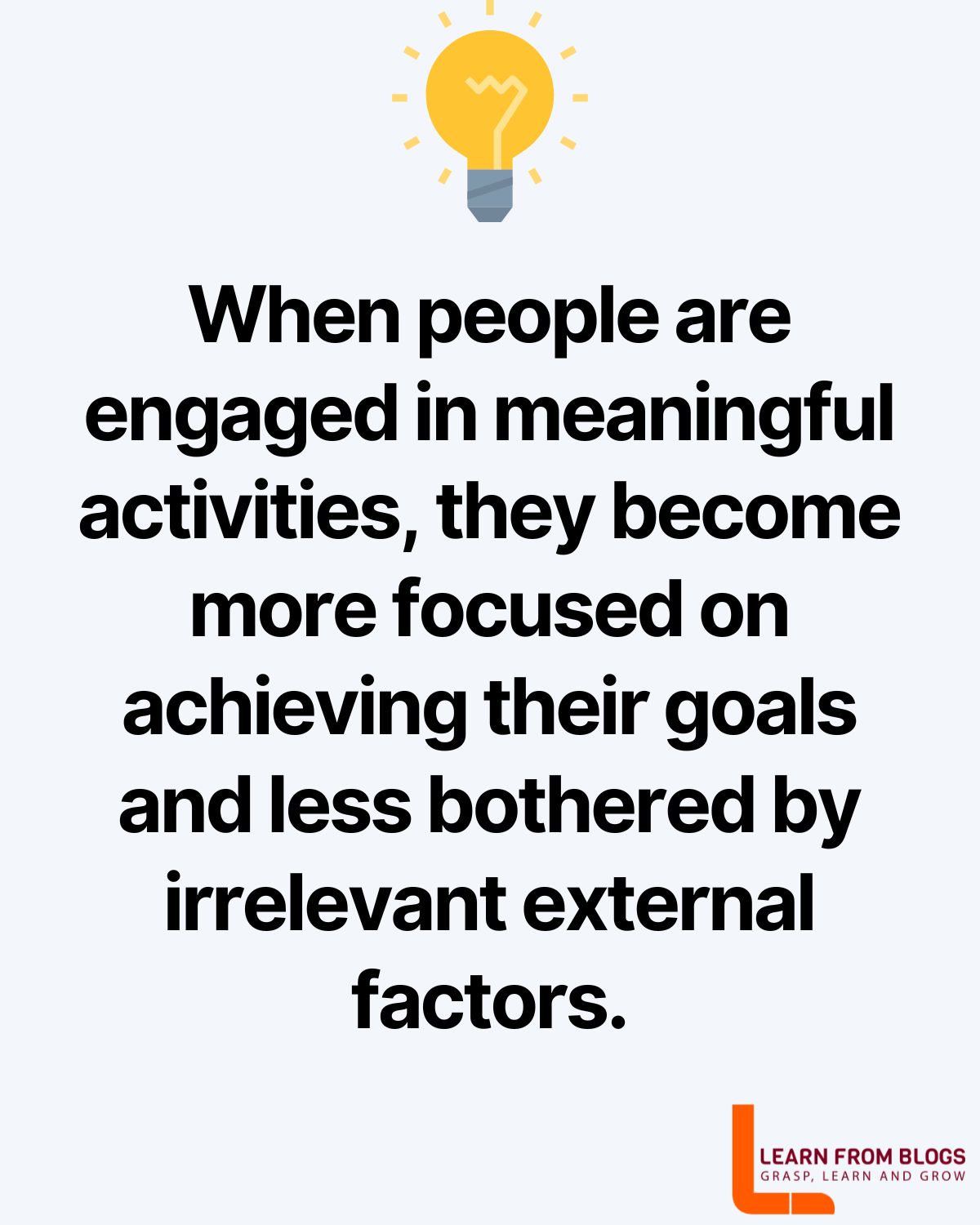
1. Maintain a healthy friends circle:
Good Friends are one of the biggest joys of life. Do not let them go. Maintain a healthy close friend circle for life.
2. Stop pointing mistakes:
People make mistakes including you. It is common. Emotional intelligence here is to stop pointing other people's mistakes blatantly. If it has to be done, do it personally. Furthermore, stop blaming and pointing people if things didn't go according to your plan.
3. Do not dwell on the past:
It is a waste of time whereas learning from the past is important here. Dwelling on the past is not good for your emotional wellbeing. It stops you from taking a step forward in your life.
4. Never hold on to anger and hate:
Letting things go is one of the best behaviors that help improve your emotional intelligence. Let go of anger and hate. It destroys your well-being. It takes away your peace and happiness. Always remember, Anger and hate are self-punishments.
5. Learn from mistakes:
We all do mistakes knowingly or unknowingly. In spite of it, accepting that you have made a mistake and learning from it is a wonderful personality.
6. Guilt or Regret is no good:
Holding on to guilt is never good. Instead, do something about it or see what things you can change to bring positivity. The same goes to regret. Regretting things in life happens to everyone. But, if it keeps happening often then it is time to self-analyze. See where things are going wrong and correct. Guilt and regret should be cleared and not be held on.
1. Be mindful:
Be mindful of everyone and everything around you. Starting from the food you eat be mindful and choose healthy options. Be mindful of other people and respect their feelings. Be mindful in choosing how you present yourself emotionally to people around you.
2. Don't bottle yourself:
Bottling up your problems and feelings does no good. Share it with someone close like a best friend or family member. Do not bottle yourself as it leads to a stressful mental state. It blocks your emotional wellness.
3. Give Credit to fellow people:
In other words, appreciate people. Support them through appreciating their efforts and giving credit for what they have done. It not only applies to your professional life but also in every walk of life.
4. Be a good listener:
Listen when people come to you to speak. Hear what they have to say. It brings trust to you. Regardless of offering a solution, just be a good listener. Being a good listener means you are acknowledging other people's thoughts and feelings. It's an important behavior for good emotional intelligence.
5. Develop good social skills:
We are always surrounded by people in every stage of our life. Socializing is important. Do not hesitate to make friends. Be the first to start conversations. Lend your help when needed. Be warm. Being Loyal, honest, being friendly and reliable are few essential social skills you need to build good emotional intelligence.
6. Convey positively:
Your thoughts, feelings, ideas and other emotions should be conveyed positively. Do not act out and expect other people to understand it. Redirect your emotional outcomes positively towards others instead of acting out. Even if it's a big mistake, try to take things positively with the person who did it. Conveying things positively has a tremendous impact.
1. Be the conflict resolver:
Wherever you are and whatever situation you are in, always be the conflict resolver. Don't be the person who creates a problem or escalate an existing problem. A foremost behavior that helps improve your emotional intelligence is this. Be the problem solver. Do what you can.
2. Take responsibility for your actions:
It is an important behavior. Be responsible enough to admit your bad actions or behaviors. Take responsibility for it. By doing so, you are acknowledging that you have something that needs to be changed. This awareness will help you become a better person.
3. Be approachable:
Friends, families, and colleagues should get a feeling that they can approach you any time anywhere. Do not be an approachable person only when you are happy. Do not be a grumpy person when you are not happy. Being stable and approachable in times of your good and bad days is an important emotional intelligence behavior.
4. Be available to others:
Do not wait for an invitation here. Be available to people in bad times as well as good times. Be available to others. Be there and support people.
5. Control your emotional outcomes:
To lose control of your emotions is to lose yourself. An emotional outcome in a good way is acceptable. When it comes to bad emotional outcomes, it is a big problem creator. Always be in control of your emotions. Be stable enough to not let anything control your emotions other than yourself. Emotional intelligence in this situation is to think before you act out of emotion.
Remember that emotional intelligence is not something that you develop in a day or month. It takes time and patience. Most importantly, one should have the will power towards self-improvement. Emotional intelligence makes sense if and only if the individual is ready to bring in goodness, improvement, and respect to themselves and the others.
Keeping in mind how beneficial emotional intelligence is for your self-building, let's see some of its associated behaviors.
50 Behaviors that Help improve Emotional Intelligence
- Be the conflict resolver:
- Take responsibility for your actions:
- Be approachable:
- Be available to others:
- Control your emotional outcomes:
- Be mindful:
- Don't bottle yourself:
- Give Credit to fellow people:
- Be a good listener:
- Develop good social skills:
- Convey positively:
- Maintain a healthy friends circle:
- Stop pointing mistakes:
- Do not dwell on the past:
- Never hold on to anger and hate:
- Learn from mistakes:
- Guilt or Regret is no good:
- Do not succumb to peer pressure:
- Enjoy what you do:
- Have time to do things you like:
- Good food equals good life:
- Physically active:
- Mentally subtle & stable:
- Do not criticize:
- Follow an easy time-management strategy in your daily life:
- Self-respect is important:
- Acceptance:
- Nurture positivity:
- Celebrate your life:
- Be grateful:
- Practice gratitude journaling:
- Spend time with people you love:
- Travel:
- It takes time:
- Build confidence:
- Know what motivates you:
- This too, shall pass:
- Do not demand perfection every time:
- Build trust:
- Take it easy:
- Think before you make promises:
- Listen to yourself & follow:
- Handling emotions is a lifelong lesson:
- You are not above or below anyone:
- Let go of the ego:
- Don't hesitate to get down for a Sorry:
- Set goals and work for it:
- Follow your passion:
- Live life to your best:
- Good Times and Bad Times are part of life:

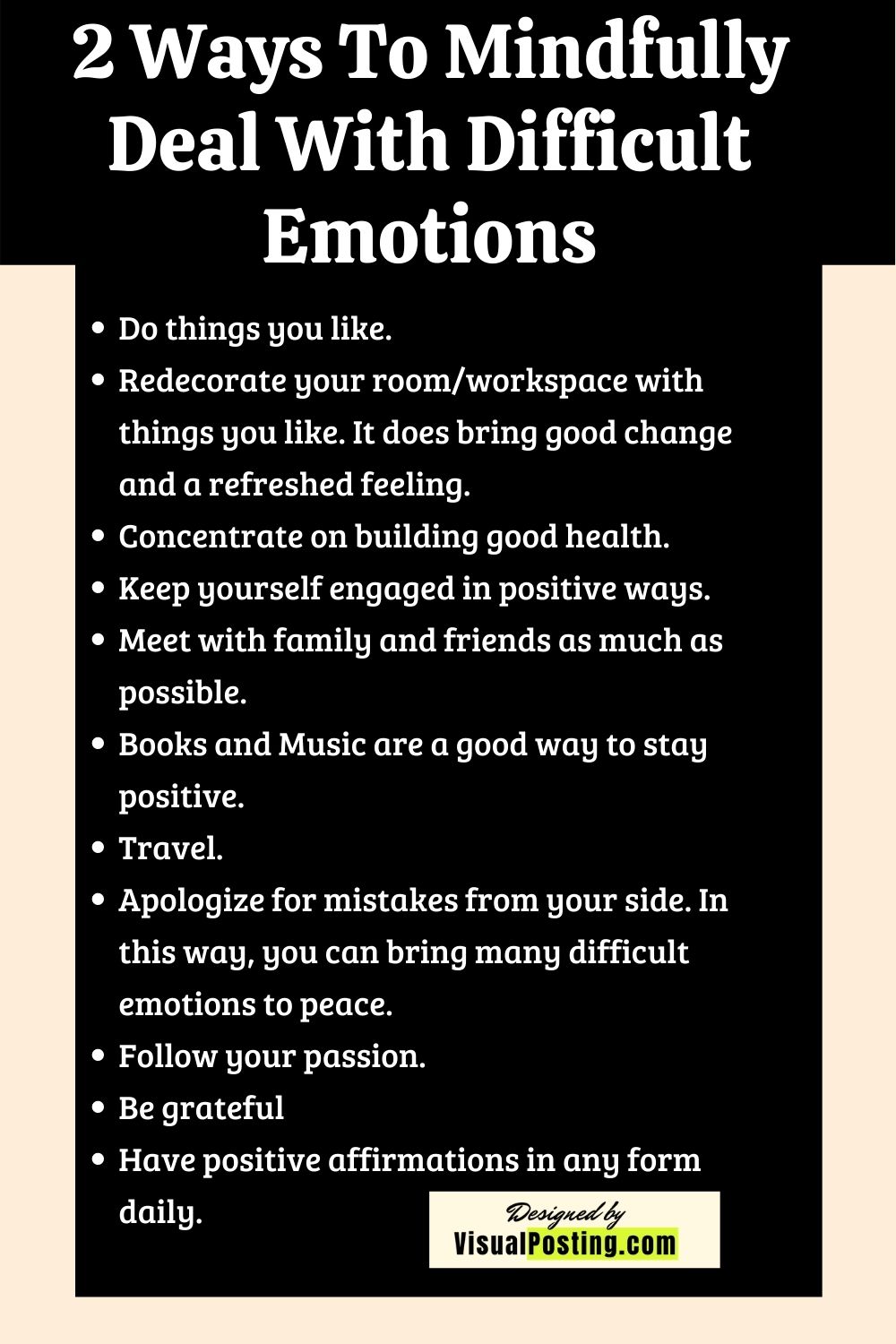
1. Nurture positivity –
Staying positive during quite difficult times is challenging. We understand that. But, try to be positive. Nurture good vibes and affirmations. Take your time to grieve yourself from difficulties. Try to practice the steps that we discussed here. Difficult emotions need positive vibes.
Some of the best ways to nurture positivity to overcome difficult emotions are:
Do things you like.
Redecorate your room/workspace with things you like. It does bring good change and a refreshed feeling.
Concentrate on building good health.
Keep yourself engaged in positive ways.
Meet with family and friends as much as possible.
Books and Music are a good way to stay positive.
Travel.
Apologize for mistakes from your side. In this way, you can bring many difficult emotions to peace.
Follow your passion.
Be grateful
Have positive affirmations in any form daily.
2. Stay grounded-
Stay grounded during tough challenging times. Let go of the ego. People going through emotional roller coasters often take ego with them. Let it go. Egos are neither productive nor are they helpful in any possible ways. Stay humble to yourself.
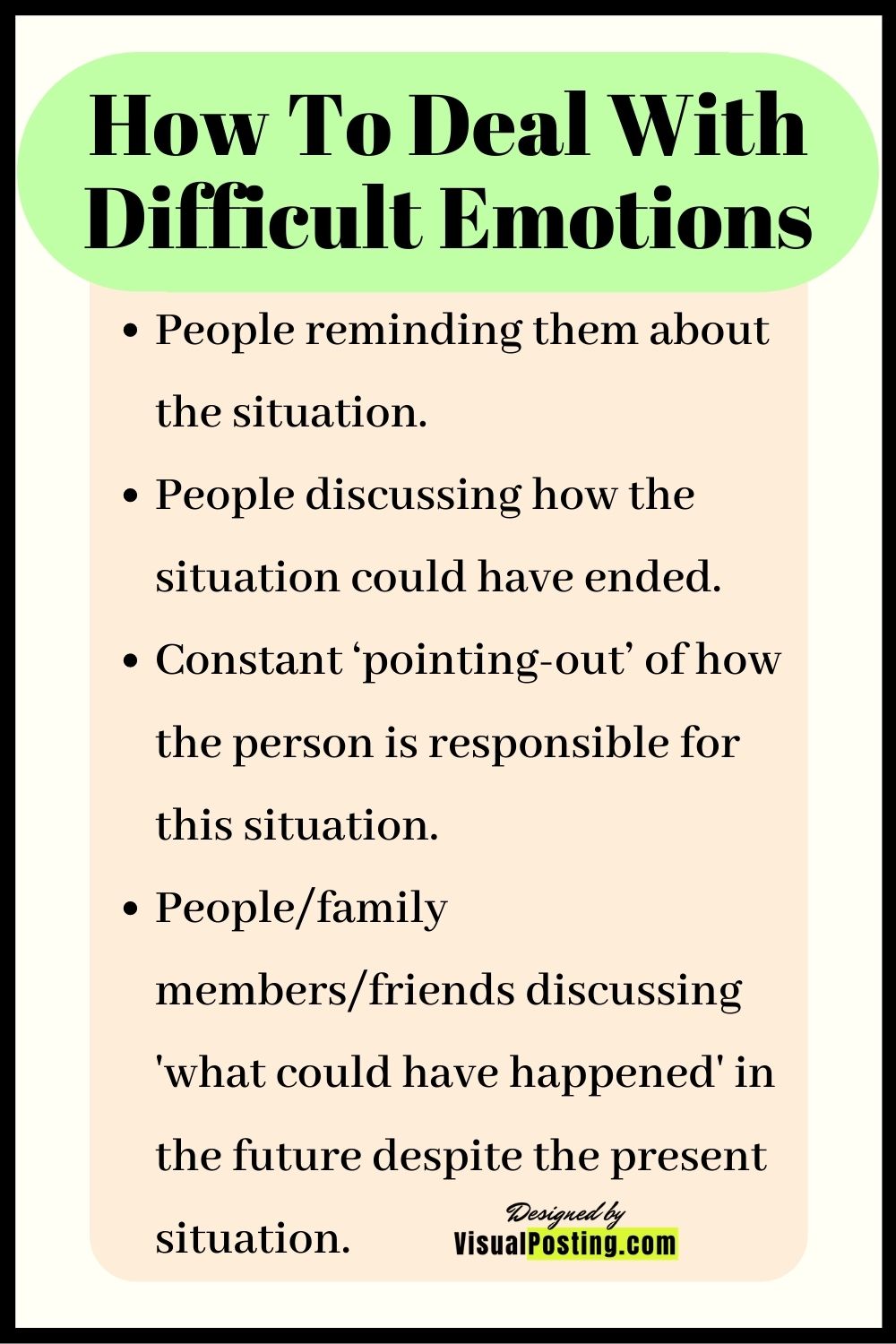
1. Analyze what triggers your emotions –
Identify the triggers that heighten your emotions. The best way to deal with difficult emotions is to identify the triggers and stay away from them or handle them positively. It is an important tip to mindfully deal with difficult problems and emotions.
To explain, let's see a situation here:
For instance, a person may be going through the emotion of guilt. In that case, a few triggers could be:
People reminding them about the situation.
People discussing how the situation could have ended.
Constant ‘pointing-out’ of how the person is responsible for this situation.
People/family members/friends discussing 'what could have happened' in the future despite the present situation.
Triggers vary according to the different emotions that a person undergoes. If you feel like you are in any vicinity where everything triggers or heightens your emotions, move away. It's a good mindful tip to handle tough emotions. If not permanently, at least you can handle it temporarily in a positive manner.
2. Gratitude –
If you like to mindfully handle difficult emotions in life, be grateful, and show gratitude. There are people who are less fortunate than you in terms of physical and mental wellness. Not one person on this earth escapes from handling difficult situations. Be thankful forever for the good things you have despite your difficult times. Gratitude can turn less into more during your difficult times. Start practicing gratitude every day. Handling difficult emotions and situations becomes peaceful when you become grateful.
3. Think before you speak out of emotion –
Be mindful of your verbal outcomes and responses during difficult times. Be mindful of how you speak. Often people find it difficult to handle verbal responses when they are emotional. Think before you speak, especially while you are emotionally challenged.
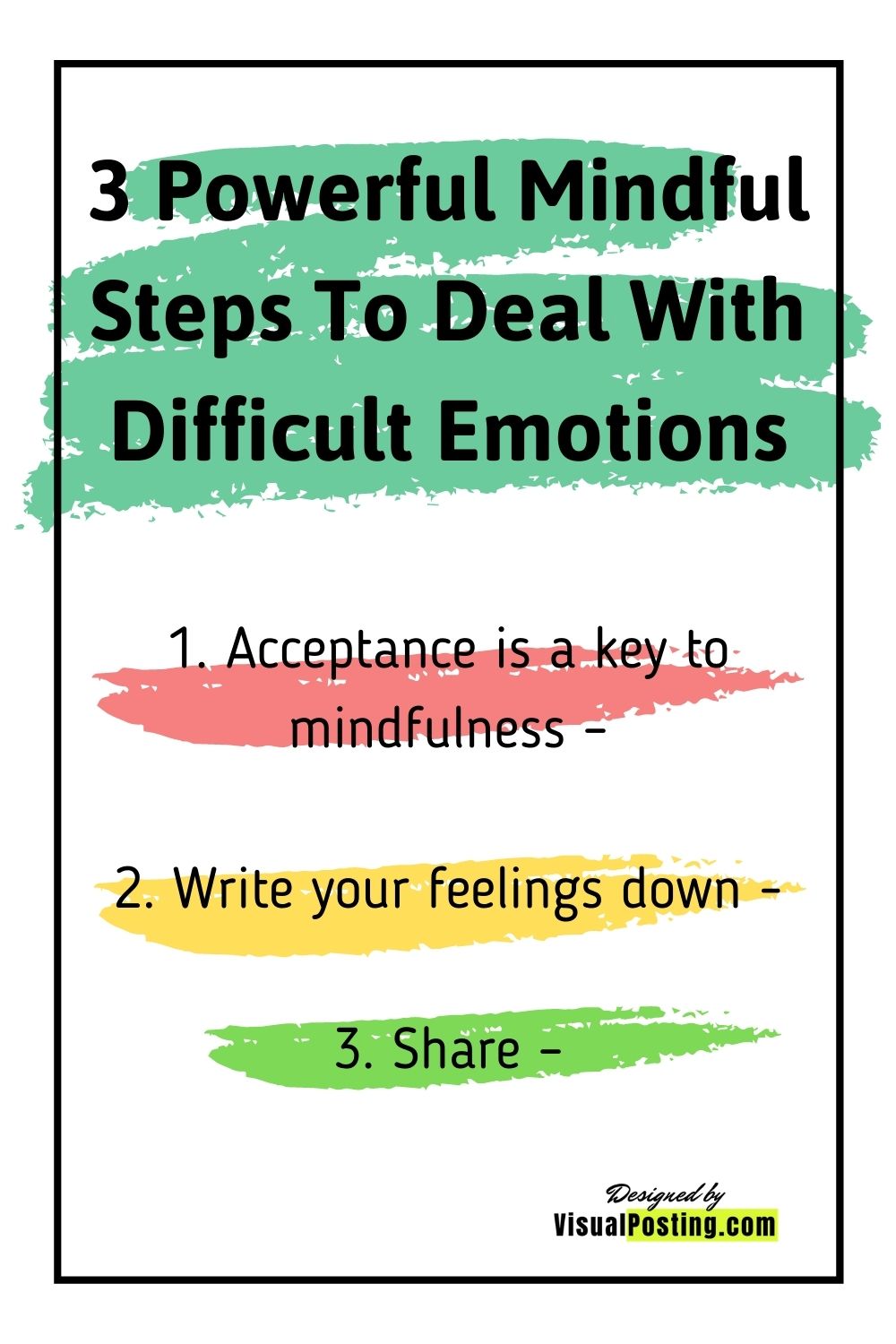
1. Acceptance is key to mindfulness –
Unless you accept that you are undergoing difficult times, it is difficult to come out. Denial is not a good way to be mindful. Acceptance is the key here. Accept yourself that it is okay to go through difficult emotions. Accept that handling difficult emotions is not easy.
Understand that it takes time to become mature and be mindful of all difficult emotions that we face in life. Once you accept your troubles, you will see that you will start to settle. You become more peaceful with yourself. Acceptance paves the way to look for what to do next and how to overcome it.
2. Write your feelings down -
It is an effective technique for mindfully handling your emotions. Write everything down. Instead of letting the emotions out and hurting yourself as well as the other, write them down. Write whenever you feel like your emotions are overwhelming for you to handle. Retrospect your writings.
Sooner or later, you can find the pattern about how and why you are acting out when it comes to tough emotions. It gives a wonderful chance to change yourself the next time. Writing your emotions down instead of letting them out is a good way.
3. Share –
Share your problems with the person you trust. Don't bottle your emotions. Discuss the emotional difficulties from time to time with someone you trust. The practice may not guarantee you exact solution you are looking for. But the practice makes sure that you are calmer, subtler, and mindful towards handling your emotions.
Talk and share. Remember the quote, "Only a few people care and the rest are curious." Don't add the extra pressure here. Make sure you have a hearty conversation now and then with your close circle.
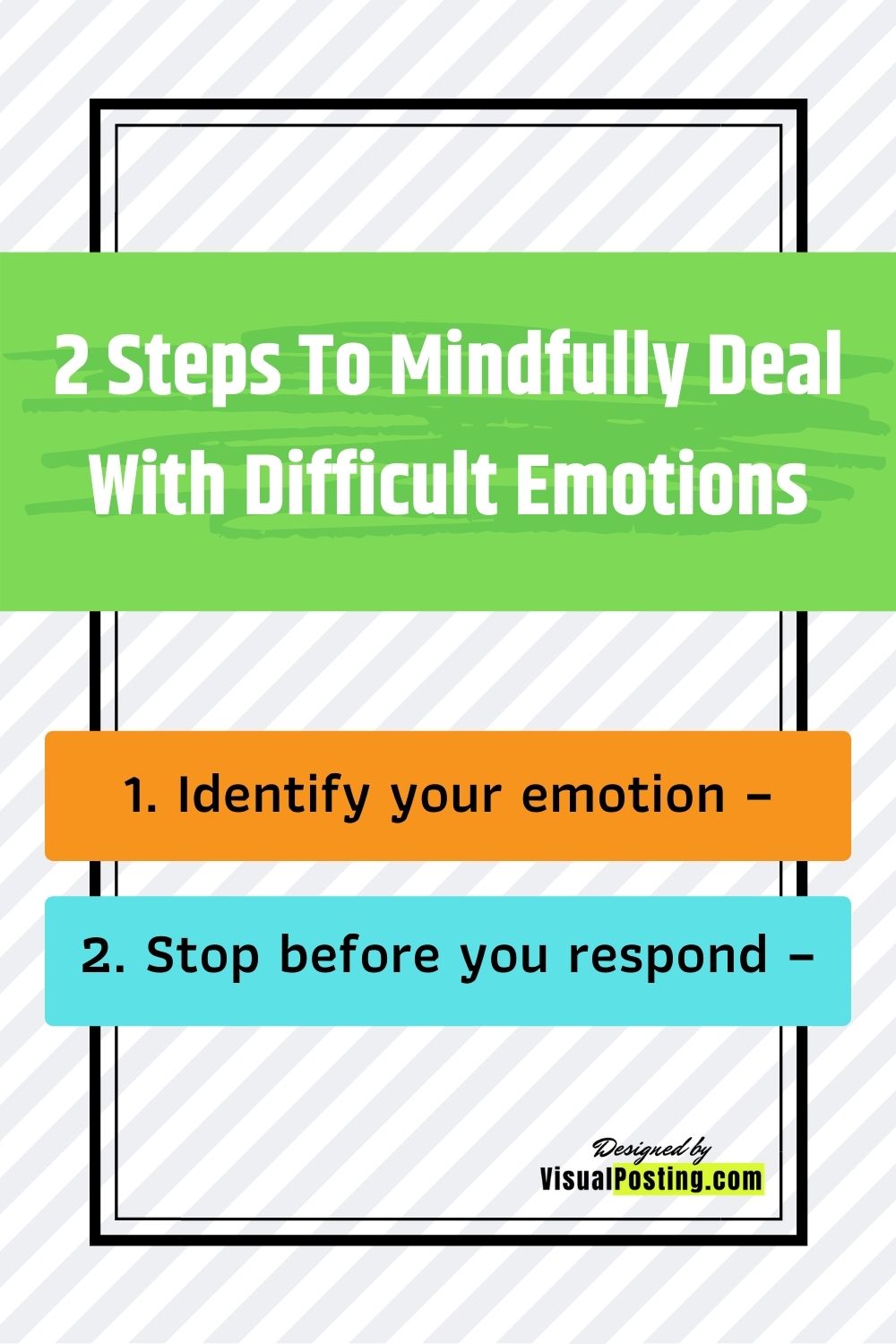
1. Identify your emotion –
Understand what's happening inside you. Pain, anger, loss, hate, remorse, guilt are few emotions that take a toll largely on any individual. The first thing in handling difficult emotions is to identifying the emotions and not denying them. By identifying your emotions, you can identify why you are acting out. By doing so, you can be more mindful in dealing with it.
For instance:
A Person can act out due to the loss of loved ones. The same person can act out differently when it comes to guilt. Likewise, if the person is holding on to hate, the acting-out can be entirely different.
The first thing you need to do for handling your difficult emotions is to identify them. Identify if the acting out is due to loss or guilt or regret, or any negative emotions for that matter. By doing so, the person can identify the reason. It gives a better way to be more positive in handling it.
2. Stop before you respond –
Words and Emotions can heal as well as break a person just like that in a second. Before you act out or respond while going through difficult emotions, stop. Stop and think before you respond. The opposite person should not be affected due to our difficult times and emotions. With this thought in mind, always think before you respond.
Make sure that you don't let your anger, guilt, regret, or any such negative emotion affect what's in front of you. Be Mindful and handle the emotion well. Let it not bother people around you.
